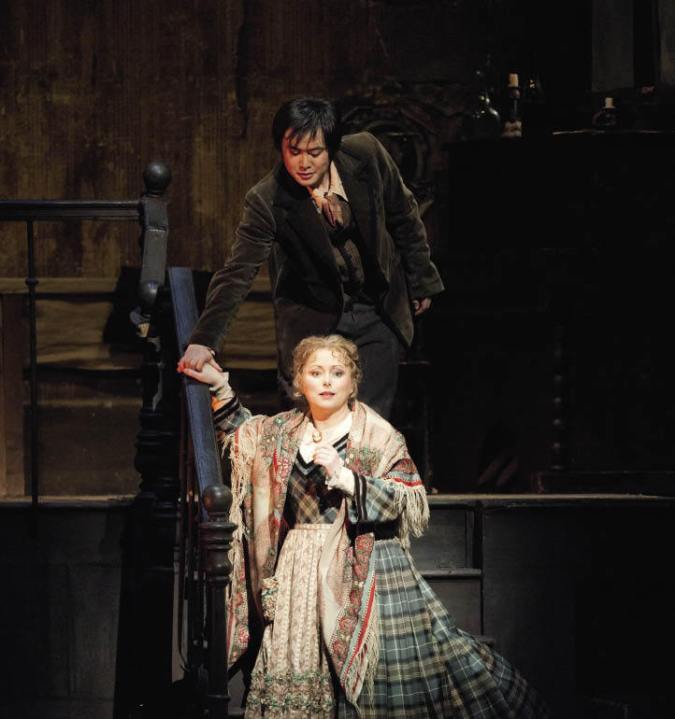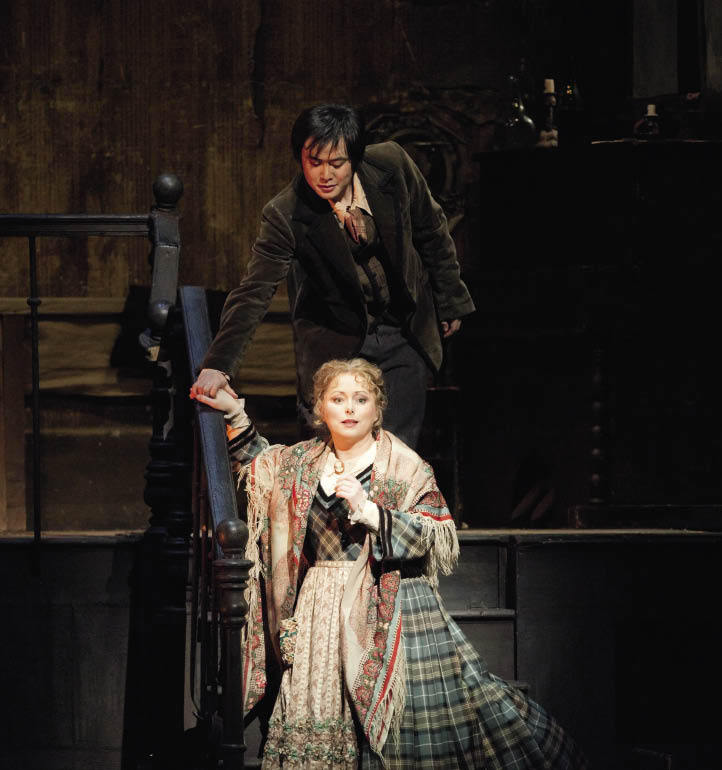La bohème
Royal Opera House
Thanks to the cautiousness of the major opera companies over the festive season, I saw Puccini’s La bohème twice in five days, with another couple of productions to go. The most fascinating aspect, for me, of seeing the Royal Opera’s 577th performance of this masterpiece, in John Copley’s production from 1974, was to compare it with the shoestring production which I saw at The Cock Tavern in Kilburn on New Year’s Eve. Many dimensions of comparison suggest themselves, the most obvious being that of cost. Tickets for The Cock are £15, those for much of the Royal Opera House about £205, with even the centre amphitheatre at £89. I’d like to talk more than I ever get a chance to to the patrons of opera houses; if you can spend £205 on one ticket for an unstarry revival — however good, and this one was in most ways excellent — then you are likely to be with someone else, to have refreshments in the interval, in short to have an evening which will be at least £600. If you go to The Cock, your priorities will evidently be different. The audience at the Royal Opera will be straining at the leash to applaud each aria, at length, so dramatic values mean little to them — and the conductor will make sure that there is a pause before the opera continues. The audience at The Cock may well not have been to that or any other opera before, and will not be primarily interested in seeing a set of stars, whether potential, actual, or clapped out, go through their paces.
It is all the more to the credit of the Royal Opera that, with odd exceptions, it takes its duties as purveyor of music-drama seriously. However many times a production is revived, one gets no sense that the main singers arrive shortly before the performance and do their own thing. The directors, in this case John Copley, often return to make sure that proceedings are still fresh. Critics have complained that this staging of La bohème is beginning to ‘look its age’, but given that the bohemians don’t live in the sprucest of settings, and that even the Café Momus may not be pristine, that seems all to the good. The important thing is that Julia Trevelyan Oman’s designs fill the stage without making it seem that the living quarters are absurdly spacious, and they do that brilliantly, so, as Andrew Porter wrote in 1974, there is no reason why they should ever be replaced, unless a trendy director is brought in to update and give a new slant to the proceedings.
Still more important, of course, is the spontaneity of the performance, and that was impressive the evening I went — unfortunately, thanks to the weather and the consequent uncertainty of rail travel, I had to leave before the end. This was the first evening of the second cast, but because of seasonal illnesses the situation was more complicated than that. The most invigorating and affecting thing was the conducting of Maurizio Benini. The most regular of all Covent Garden’s visiting conductors, he has sometimes seemed to me the man they call in when they want to make sure that the musical side is in safe hands. But in this case he demonstrated how much more he is than that. From the opening bar onwards there was vivid, colourful playing, an unusual attention to detail, and above all a loving understanding of Puccinian rubato, which is not quite like anyone else’s. Phrases tapered beautifully, sonorities contributed to the dramatic structure, there were no overblown dynamics, intimacy was preserved even at the most thrilling climaxes.
Benini was working with a young cast, and in the case of Ji-Min Park, the Korean Rodolfo, with a singer whose voice is clearly not yet ready to take on the challenges of filling such a large auditorium. He was too often strained in a way that he couldn’t convert into emotional stress. Rebecca Evans, the Mimi, has no large voice either, but she gave Park a lesson in how to swell and fill out the sound so that temporarily it seemed as if she did have. With sensitive accompaniment, the last quarter-hour of Act I generated the necessary frisson, as it emphatically didn’t in Kilburn — the accompanist there should go and listen to Benini.
Though the audience at the Royal Opera seems not to want to be moved, even for a moment, by Mimi’s illness and death and the general deprivation and misery of Acts III and IV, if it had wanted to be, the performance was of a quality to oblige. What I don’t think can happen in those vast spaces, as it does so powerfully at The Cock, is an involvement so strong that you feel you are a silent member of the cast or, better, a silent bohemian, sharing the pain rather than observing it, however sympathetically. I want to do both. But if I had to choose, I would — all extra-artistic considerations aside — head for The Cock.







Comments